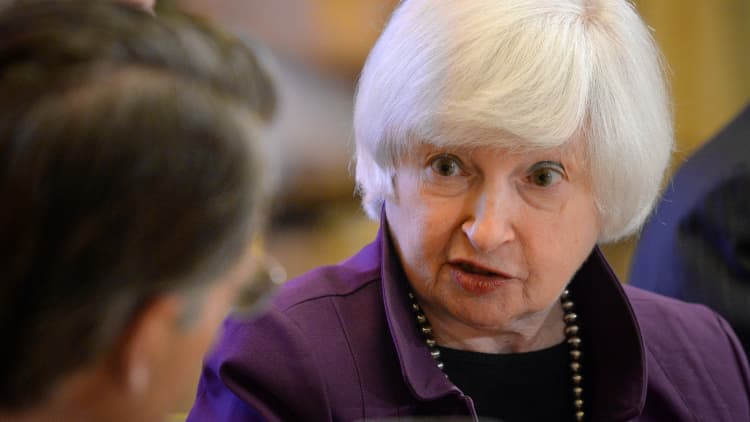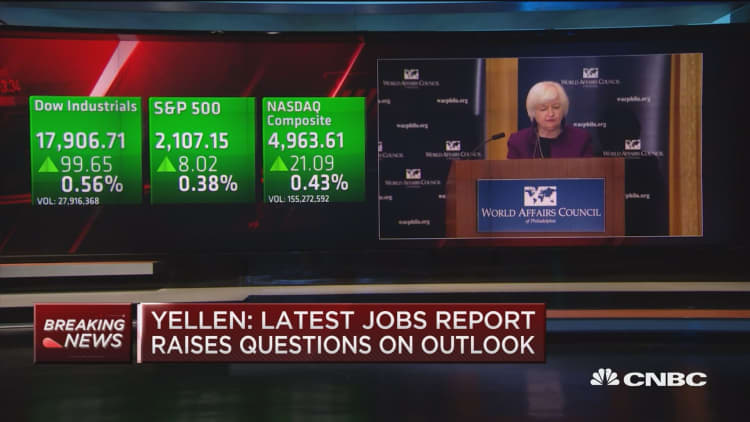


Federal Reserve Chair Janet Yellen struck a generally positive tone on the U.S. economy on Monday, warning that Fed watchers shouldn't overreact to last week's disappointing jobs report.
Speaking at an event in Philadelphia, Yellen insisted that the Fed needs to raise rates, but she stepped back from putting a time frame. Still, the Fed funds rate probably needs to rise gradually over time, and that should come before all of the central bank's economic goals have been fully reached, she said.
Expectations for the next Fed rate hike were knocked back after U.S. nonfarm payroll data on Friday showed U.S. employers had added only 38,000 jobs in May, far below expectations of 164,000.
Ahead of Yellen's afternoon remarks, CME's FedWatch tool showed the market implied that the probability of a rate hike is about 6 percent in June and 37 percent in July.
Yellen said the overall labor market is quite positive. Although the recent slowdown in jobs bears "close watching," she said, wage growth may "finally be picking up."
"Although this recent labor market report was, on balance, concerning, let me emphasize that one should never attach too much significance to any single monthly report," she said in prepared remarks.
Still, Yellen said an important theme of her remarks is the "inevitable uncertainty surrounding the outlook for the economy."
"The uncertainties are sizable, and progress toward our goals and, by implication, the appropriate stance of monetary policy will depend on how these uncertainties evolve," she said.
She said key areas include the resilience of domestic demand, the international economic situation, productivity growth and the inflation outlook.
On domestic investment, Yellen said she suspects there's a "transitory element" to recent weakness, but she acknowledged that labor market data "raise the less favorable possibility that firms may instead have decided to expand their operations more slowly."
On the international front, Yellen said she is optimistic that foreign headwinds are fading, but added that the chance of a "Brexit" could have "significant economic repercussions." (Britain is holding a referendum on European Union membership later this month.)
Monday was the Fed chair's last chance to offer insight into Fed thinking before a media blackout takes effect ahead of the central bank's June 14-15 monetary policy meeting.
Near the conclusion of her remarks, Yellen offered a series of questions with which she and her colleagues expect to grapple following the recent labor data.
"Is the markedly reduced pace of hiring in April and May a harbinger of a persistent slowdown in the broader economy? Or will monthly payroll gains move up toward the solid pace they maintained earlier this year and in 2015? Does the latest reading on the unemployment rate indicate that we are essentially back to full employment, or does relatively subdued wage growth signal that more slack remains?" she asked.
During a question and answer session following her remarks, Yellen sidestepped an inquiry about the Fed's thinking on presumptive GOP presidential nominee Donald Trump. "We're very focused on doing our jobs," she said amid laughter in the room, adding that the Fed will "see what happens."
The Fed raised its key benchmark interest rate in December for the first time in nearly a decade but has held off since then due to concerns about a global economic slowdown and financial market volatility.
—Reuters contributed to this report.


